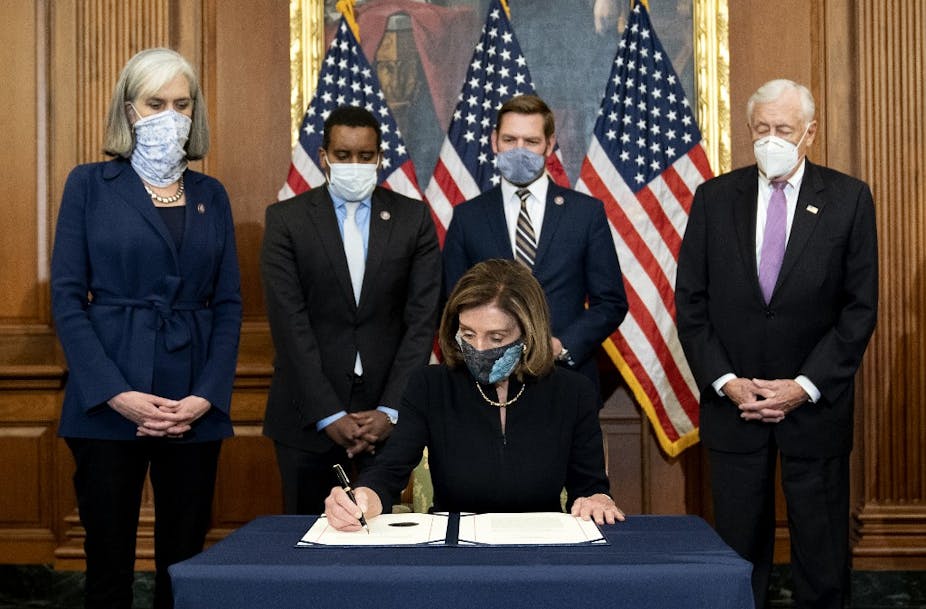On January 13, 2021, President Donald Trump was impeached for the second time, charged with “incitement of insurrection: in the January 6 attack on the US Capitol. Less than two weeks later, on January 25, the House of Representatives sent the articles of impeachment to the US Senate, setting up a second trial.
Grave charges, but serious doubts of bipartisan support
Given the gravity and clarity of the charges against Trump, some Democrats have expressed hope that the Senate could vote to convict. Rhode Island representative David Cicilline stated, "I expect that we’ll have Republican support”. At the very least, the President’s actions represent a serious attack on the Senate, the second wing of Congress.
In his description of checks and balances, (Summary Essay 50 of the Federalist Papers), the fourth President of the United States, James Madison, stated that the ambition of elected representatives is counteracted by the extent of their own power. Senators’ interests are tied up with the institutions they represent. The physical and symbolic insult and injury to Congress were so egregious as to require a response.
But impeachment requires a two-thirds majority and there is currently no way of knowing how many Republican senators might vote in favor. At the time of certification, prior to the assault on the Capitol, 18 refused to recognize Biden’s victory. That number fell to 8 after the attack but, in the House, two-thirds of Republican representatives (139), including minority leaders Kevin McCarthy (California) and Steve Scalise (Louisiana), objected to the election results. On January 13, only 10 House Republicans voted for impeachment, meaning that 84% voted against the motion.
Could 17 Republicans be persuaded to vote for impeachment in the Senate? As mentioned, the Republicans currently make up exactly half of the Senate, with Vice President Kamala Harris being the tie-breaker vote, giving control to the Democrats. Only one Republican, Mitt Romney (Utah), who ran against Barack Obama in 2012, voted to convict Trump in the first impeachment last February. This time around, Romney was again the first to squarely blame Trump for inciting the attack and to take a stand in favor of impeachment.
Other Republican Senators called for Trump’s immediate resignation (which was not forthcoming): Lisa Murkowski (Alaska), Susan Collins (Maine), Liz Cheney (Wyoming), Patrick J. Toomey (Pennsylvania), Ben Sasse (Nebraska) and Roy Blunt (Missouri). In addition, two of Trump’s most ardent supporters appear to have thrown in the towel since the January 6 attack: Lindsay Graham (South Carolina), who famously said “enough is enough,” but was seen traveling to Texas with the president on Air Force One just days later. Far more significant is the position of Mitch McConnell (Kentucky), now the minority leader. He refused to join the objectors in December and forthrightly confirmed Biden’s victory on January 6-7.
According to sources close to the senator, McConnell supported Trump’s second impeachment. But in his public statement, he did not specifically state that he would vote guilty in a Senate trial. A total of eight Republican Senators could vote in favor of impeachment.
Conversely, an equal number of 8 Republican senators have defended Trump’s actions. These are the same ones now being accused of perpetuating lies about electoral fraud in the hope that they will harvest some of the support of the 74 million Americans who voted for Trump: the far-right Josh Hawley (Missouri) and Ted Cruz (Texas), as well as six like-minded senators: Rick Scott (Florida), John Neely Kennedy (Louisiana), Tommy Tuberville (Alabama), Cindy Hyde-Smith (Mississippi), Cynthia Lummis (Wyoming) and Roger Marshall (Kansas).
Which of these two groups most closely represents the private opinions of the majority of Republicans? Likely the latter, especially taking into account the 20 or so Republican senators who are up for reelection in 2022.
Under these circumstances, the Democrats will have to convince at least nine Republican senators to vote to convict Trump to secure a guilty verdict. This may prove difficult, or even impossible, to achieve. On January 26, only five voted to proceed with Trump’s impeachment trial, standing with their 50 Democratic colleagues. McConnell, Blunt and Graham voted against, as did the other Republican senators. That does not make the odds of Trump’s being convicted particularly high.
The Fact check US section received support from Craig Newmark Philanthropies, an American foundation fighting against disinformation.
Translated from the French by Alice Heathwood for Fast ForWord.


